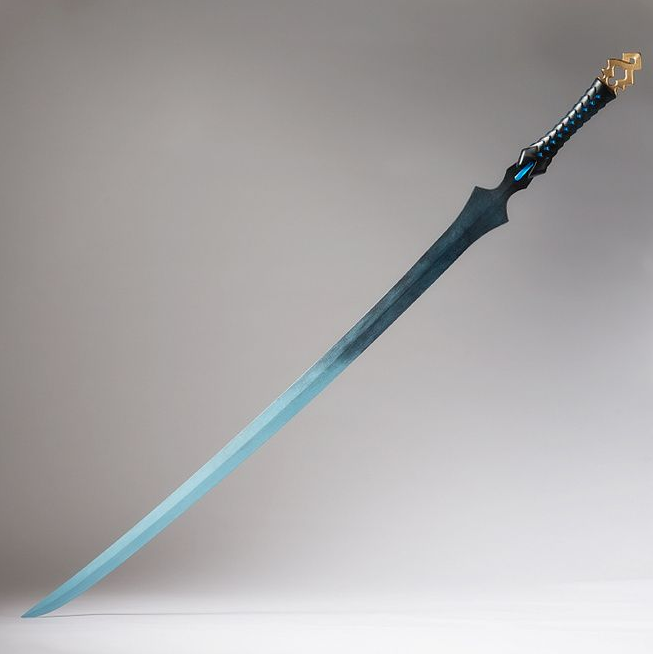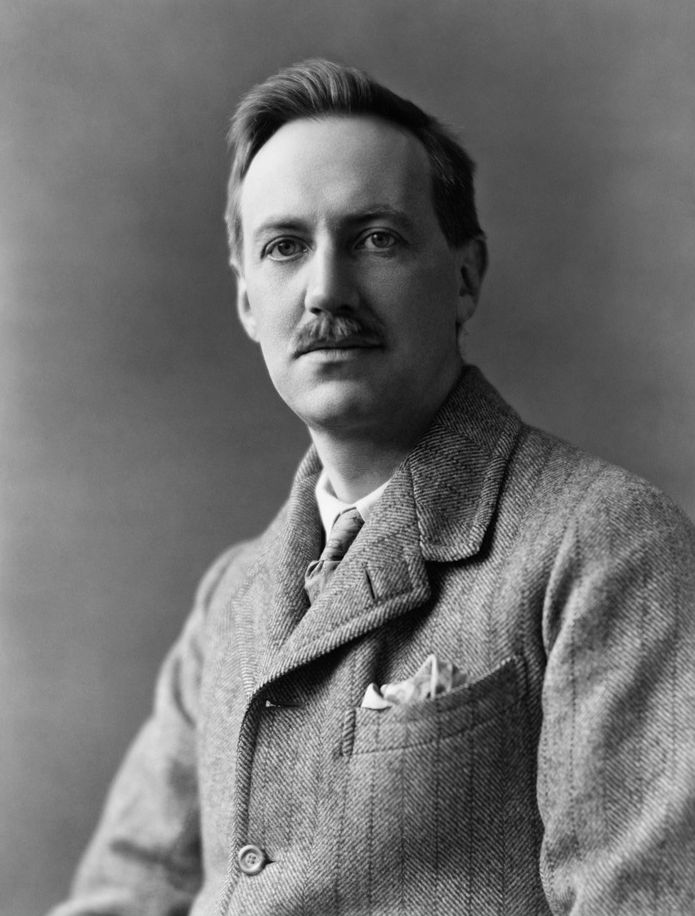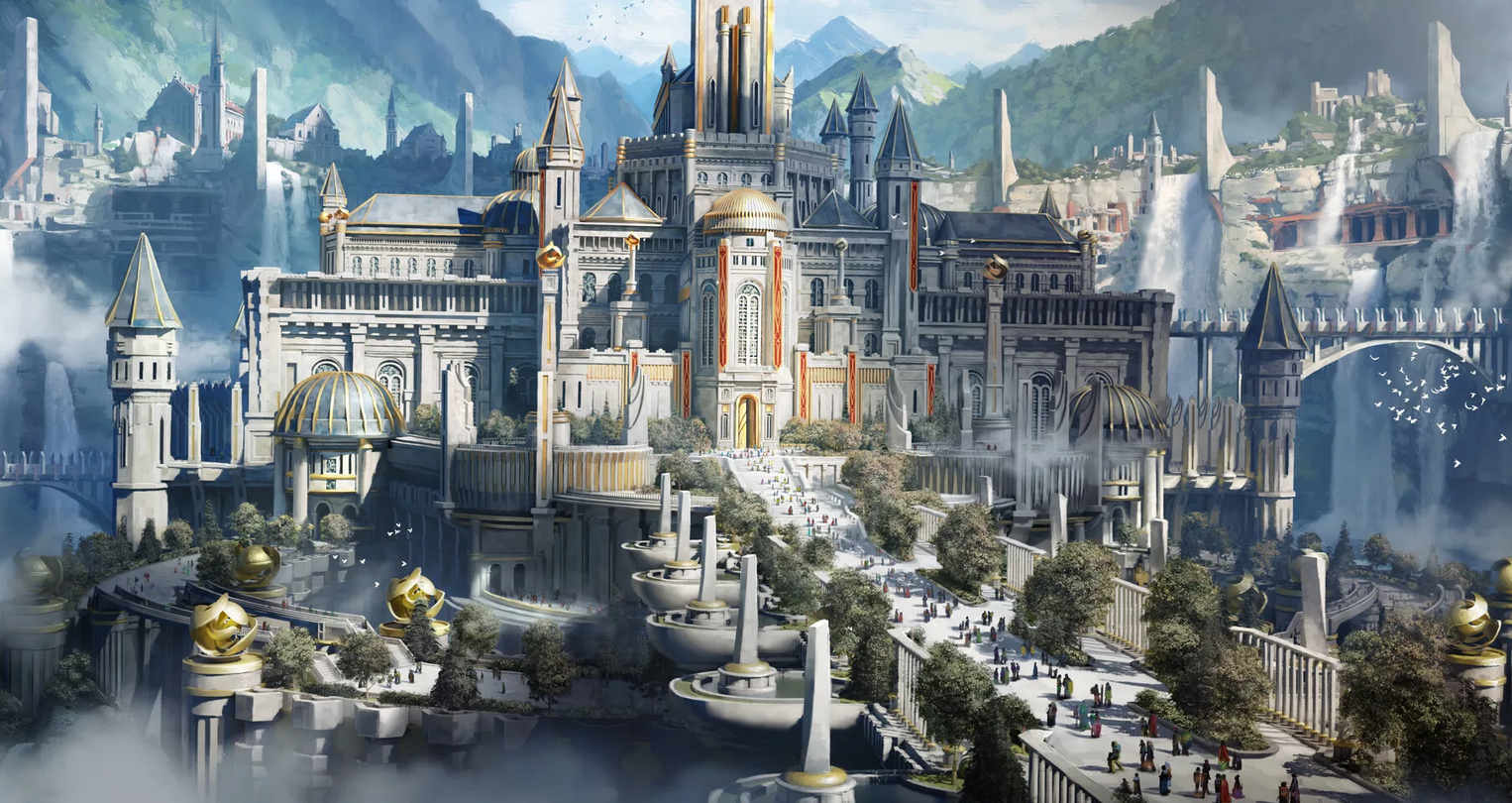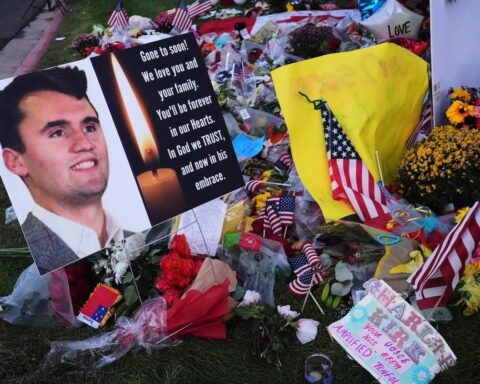Editor’s note: The following is extracted from The Sword of Welleran and Other Stories, by Lord Dunsany (published 1908).
Where the great plain of Tarphet runs up, as the sea in estuaries, among the Cyresian mountains, there stood long since the city of Merimna well-nigh among the shadows of the crags. I have never seen a city in the world so beautiful as Merimna seemed to me when first I dreamed of it. It was a marvel of spires and figures of bronze, and marble fountains, and trophies of fabulous wars, and broad streets given over wholly to the Beautiful. Right through the centre of the city there went an avenue fifty strides in width, and along each side of it stood likenesses in bronze of the Kings of all the countries that the people of Merimna had ever known. At the end of that avenue was a colossal chariot with three bronze horses driven by the winged figure of Fame, and behind her in the chariot the huge form of Welleran, Merimna’s ancient hero, standing with extended sword. So urgent was the mien and attitude of Fame, and so swift the pose of the horses, that you had sworn that the chariot was instantly upon you, and that its dust already veiled the faces of the Kings. And in the city was a mighty hall wherein were stored the trophies of Merimna’s heroes. Sculptured it was and domed, the glory of the art of masons a long while dead, and on the summit of the dome the image of Rollory sat gazing across the Cyresian mountains towards the wide lands beyond, the lands that knew his sword. And beside Rollory, like an old nurse, the figure of Victory sat, hammering into a golden wreath of laurels for his head the crowns of fallen Kings.
Such was Merimna, a city of sculptured Victories and warriors of bronze. Yet in the time of which I write the art of war had been forgotten in Merimna, and the people almost slept. To and fro and up and down they would walk through the marble streets, gazing at memorials of the things achieved by their country’s swords in the hands of those that long ago had loved Merimna well. Almost they slept, and dreamed of Welleran, Soorenard, Mommolek, Rollory, Akanax, and young Iraine. Of the lands beyond the mountains that lay all round about them they knew nothing, save that they were the theatre of the terrible deeds of Welleran, that he had done with his sword. Long since these lands had fallen back into the possession of the nations that had been scourged by Merimna’s armies. Nothing now remained to Merimna’s men save their inviolate city and the glory of the remembrance of their ancient fame. At night they would place sentinels far out in the desert, but these always slept at their posts dreaming of Rollory, and three times every night a guard would march around the city clad in purple, bearing lights and singing songs of Welleran. Always the guard went unarmed, but as the sound of their song went echoing across the plain towards the looming mountains, the desert robbers would hear the name of Welleran and steal away to their haunts. Often dawn would come across the plain, shimmering marvellously upon Merimna’s spires, abashing all the stars, and find the guard still singing songs of Welleran, and would change the colour of their purple robes and pale the lights they bore. But the guard would go back leaving the ramparts safe, and one by one the sentinels in the plain would awake from dreaming of Rollory and shuffle back into the city quite cold. Then something of the menace would pass away from the faces of the Cyresian mountains, that from the north and the west and the south lowered upon Merimna, and clear in the morning the statues and the pillars would arise in the old inviolate city. You would wonder that an unarmed guard and sentinels that slept could defend a city that was stored with all the glories of art, that was rich in gold and bronze, a haughty city that had erst oppressed its neighbours, whose people had forgotten the art of war. Now this is the reason that, though all her other lands had long been taken from her, Merimna’s city was safe. A strange thing was believed or feared by the fierce tribes beyond the mountains, and it was credited among them that at certain stations round Merimna’s ramparts there still rode Welleran, Soorenard, Mommolek, Rollory, Akanax, and young Iraine. Yet it was close on a hundred years since Iraine, the youngest of Merimna’s heroes, fought his last battle with the tribes.
Sometimes indeed there arose among the tribes young men who doubted and said: ‘How may a man for ever escape death?’
But graver men answered them: ‘Hear us, ye whose wisdom has discerned so much, and discern for us how a man may escape death when two score horsemen assail him with their swords, all of them sworn to kill him, and all of them sworn upon their country’s gods; as often Welleran hath. Or discern for us how two men alone may enter a walled city by night, and bring away from it that city’s king, as did Soorenard and Mommolek. Surely men that have escaped so many swords and so many sleety arrows shall escape the years and Time.’
And the young men were humbled and became silent. Still, the suspicion grew. And often when the sun set on the Cyresian mountains, men in Merimna discerned the forms of savage tribesmen black against the light, peering towards the city.
All knew in Merimna that the figures round the ramparts were only statues of stone, yet even there a hope lingered among a few that some day their old heroes would come again, for certainly none had ever seen them die. Now it had been the wont of these six warriors of old, as each received his last wound and knew it to be mortal, to ride away to a certain deep ravine and cast his body in, as somewhere I have read great elephants do, hiding their bones away from lesser beasts. It was a ravine steep and narrow even at the ends, a great cleft into which no man could come by any path. There rode Welleran alone, panting hard; and there later rode Soorenard and Mommolek, Mommolek with a mortal wound upon him not to return, but Soorenard was unwounded and rode back alone from leaving his dear friend resting among the mighty bones of Welleran. And there rode Soorenard, when his day was come, with Rollory and Akanax, and Rollory rode in the middle and Soorenard and Akanax on either side. And the long ride was a hard and weary thing for Soorenard and Akanax, for they both had mortal wounds; but the long ride was easy for Rollory, for he was dead. So the bones of these five heroes whitened in an enemy’s land, and very still they were, though they had troubled cities, and none knew where they lay saving only Iraine, the young captain, who was but twenty-five when Mommolek, Rollory, and Akanax rode away. And among them were strewn their saddles and their bridles, and all the accoutrements of their horses, lest any man should ever find them afterwards and say in some foreign city: ‘Lo! the bridles or the saddles of Merimna’s captains, taken in war,’ but their beloved trusty horses they turned free.
Forty years afterwards, in the hour of a great victory, his last wound came upon Iraine, and the wound was terrible and would not close. And Iraine was the last of the captains, and rode away alone. It was a long way to the dark ravine, and Iraine feared that he would never come to the resting-place of the old heroes, and he urged his horse on swiftly, and clung to the saddle with his hands. And often as he rode he fell asleep, and dreamed of earlier days, and of the times when he first rode forth to the great wars of Welleran, and of the time when Welleran first spake to him, and of the faces of Welleran’s comrades when they led charges in the battle. And ever as he awoke a great longing arose in his soul as it hovered on his body’s brink, a longing to lie among the bones of the old heroes. At last when he saw the dark ravine making a scar across the plain, the soul of Iraine slipped out through his great wound and spread its wings, and pain departed from the poor hacked body, and, still urging his horse forward, Iraine died. But the old true horse cantered on till suddenly he saw before him the dark ravine and put his forefeet out on the very edge of it and stopped. Then the body of Iraine came toppling forward over the right shoulder of the horse, and his bones mingle and rest as the years go by with the bones of Merimna’s heroes.
Now there was a little boy in Merimna named Rold. I saw him first, I, the dreamer, that sit before my fire asleep, I saw him first as his mother led him through the great hall where stand the trophies of Merimna’s heroes. He was five years old, and they stood before the great glass casket wherein lay the sword of Welleran, and his mother said: ‘The sword of Welleran.’ And Rold said: ‘What should a man do with the sword of Welleran?’ And his mother answered: ‘Men look at the sword and remember Welleran.’ And they went on and stood before the great red cloak of Welleran, and the child said: ‘Why did Welleran wear this great red cloak?’ And his mother answered: ‘It was the way of Welleran.’
When Rold was a little older he stole out of his mother’s house quite in the middle of the night when all the world was still, and Merimna asleep dreaming of Welleran, Soorenard, Mommolek, Rollory, Akanax, and young Iraine. And he went down to the ramparts to hear the purple guard go by singing of Welleran. And the purple guard came by with lights, all singing in the stillness, and dark shapes out in the desert turned and fled. And Rold went back again to his mother’s house with a great yearning towards the name of Welleran, such as men feel for very holy things.
And in time Rold grew to know the pathway all round the ramparts, and the six equestrian statues that were there guarding Merimna still. These statues were not like other statues, they were so cunningly wrought of many-coloured marbles that none might be quite sure until very close that they were not living men. There was a horse of dappled marble, the horse of Akanax. The horse of Rollory was of alabaster, pure white, his armour was wrought out of a stone that shone, and his horseman’s cloak was made of a blue stone, very precious. He looked northwards.
But the marble horse of Welleran was pure black, and there sat Welleran upon him looking solemnly westwards. His horse it was whose cold neck Rold most loved to stroke, and it was Welleran whom the watchers at sunset on the mountains the most clearly saw as they peered towards the city. And Rold loved the red nostrils of the great black horse and his rider’s jasper cloak.
Now beyond the Cyresians the suspicion grew that Merimna’s heroes were dead, and a plan was devised that a man should go by night and come close to the figures upon the ramparts and see whether they were Welleran, Soorenard, Mommolek, Rollory, Akanax, and young Iraine. And all were agreed upon the plan, and many names were mentioned of those who should go, and the plan matured for many years. It was during these years that watchers clustered often at sunset upon the mountains but came no nearer. Finally, a better plan was made, and it was decided that two men who had been by chance condemned to death should be given a pardon if they went down into the plain by night and discovered whether or not Merimna’s heroes lived. At first the two prisoners dared not go, but after a while one of them, Seejar, said to his companion, Sajar-Ho: ‘See now, when the King’s axeman smites a man upon the neck that man dies.’
And the other said that this was so. Then said Seejar: ‘And even though Welleran smite a man with his sword no more befalleth him than death.’
Then Sajar-Ho thought for a while. Presently he said: ‘Yet the eye of the King’s axeman might err at the moment of his stroke or his arm fail him, and the eye of Welleran hath never erred nor his arm failed. It were better to bide here.’
Then said Seejar: ‘Maybe that Welleran is dead and that some other holds his place upon the ramparts, or even a statue of stone.’
But Sajar-Ho made answer: ‘How can Welleran be dead when he even escaped from two score horsemen with swords that were sworn to slay him, and all sworn upon our country’s gods?’
And Seejar said: ‘This story his father told my grandfather concerning Welleran. On the day that the fight was lost on the plains of Kurlistan he saw a dying horse near to the river, and the horse looked piteously towards the water but could not reach it. And the father of my grandfather saw Welleran go down to the river’s brink and bring water from it with his own hand and give it to the horse. Now we are in as sore a plight as was that horse, and as near to death; it may be that Welleran will pity us, while the King’s axeman cannot because of the commands of the King.’
Then said Sajar-Ho: ‘Thou wast ever a cunning arguer. Thou broughtest us into this trouble with thy cunning and thy devices, we will see if thou canst bring us out of it. We will go.’
So news was brought to the King that the two prisoners would go down to Merimna.
That evening the watchers led them to the mountain’s edge, and Seejar and Sajar-Ho went down towards the plain by the way of a deep ravine, and the watchers watched them go. Presently their figures were wholly hid in the dusk. Then night came up, huge and holy, out of waste marshes to the eastwards and low lands and the sea; and the angels that watched over all men through the day closed their great eyes and slept, and the angels that watched over all men through the night awoke and ruffled their deep blue feathers and stood up and watched. But the plain became a thing of mystery filled with fears. So the two spies went down the deep ravine, and coming to the plain sped stealthily across it. Soon they came to the line of sentinels asleep upon the sand, and one stirred in his sleep calling on Rollory, and a great dread seized upon the spies and they whispered ‘Rollory lives,’ but they remembered the King’s axeman and went on. And next they came to the great bronze statue of Fear, carved by some sculptor of the old glorious years in the attitude of flight towards the mountains, calling to her children as she fled. And the children of Fear were carved in the likeness of the armies of all the trans-Cyresian tribes with their backs towards Merimna, flocking after Fear. And from where he sat on his horse behind the ramparts the sword of Welleran was stretched out over their heads as ever it was wont. And the two spies kneeled down in the sand and kissed the huge bronze foot of the statue of Fear, saying: ‘O Fear, Fear.’ And as they knelt they saw lights far off along the ramparts coming nearer and nearer, and heard men singing of Welleran. And the purple guard came nearer and went by with their lights, and passed on into the distance round the ramparts still singing of Welleran. And all the while the two spies clung to the foot of the statue, muttering: ‘O Fear, Fear.’ But when they could hear the name of Welleran no more they arose and came to the ramparts and climbed over them and came at once upon the figure of Welleran, and they bowed low to the ground, and Seejar said: ‘O Welleran, we came to see whether thou didst yet live.’ And for a long while they waited with their faces to the earth. At last Seejar looked up towards Welleran’s terrible sword, and it was still stretched out pointing to the carved armies that followed after Fear. And Seejar bowed to the ground again and touched the horse’s hoof, and it seemed cold to him. And he moved his hand higher and touched the leg of the horse, and it seemed quite cold. At last he touched Welleran’s foot, and the armour on it seemed hard and stiff. Then as Welleran moved not and spake not, Seejar climbed up at last and touched his hand, the terrible hand of Welleran, and it was marble. Then Seejar laughed aloud, and he and Sajar-Ho sped down the empty pathway and found Rollory, and he was marble too. Then they climbed down over the ramparts and went back across the plain, walking contemptuously past the figure of Fear, and heard the guard returning round the ramparts for the third time, singing of Welleran; and Seejar said: ‘Ay, you may sing of Welleran, but Welleran is dead and a doom is on your city.’
And they passed on and found the sentinel still restless in the night and calling on Rollory. And Sajar-Ho muttered: ‘Ay, you may call on Rollory, but Rollory is dead and naught can save your city.’
And the two spies went back alive to their mountains again, and as they reached them the first ray of the sun came up red over the desert behind Merimna and lit Merimna’s spires. It was the hour when the purple guard were wont to go back into the city with their tapers pale and their robes a brighter colour, when the cold sentinels came shuffling in from dreaming in the desert; it was the hour when the desert robbers hid themselves away, going back to their mountain caves; it was the hour when gauze-winged insects are born that only live for a day; it was the hour when men die that are condemned to death; and in this hour a great peril, new and terrible, arose for Merimna and Merimna knew it not.
Then Seejar turning said: ‘See how red the dawn is and how red the spires of Merimna. They are angry with Merimna in Paradise and they bode its doom.’
So the two spies went back and brought the news to their King, and for a few days the Kings of those countries were gathering their armies together; and one evening the armies of four Kings were massed together at the top of the deep ravine, all crouching below the summit waiting for the sun to set. All wore resolute and fearless faces, yet inwardly every man was praying to his gods, unto each one in turn.
Then the sun set, and it was the hour when the bats and the dark creatures are abroad and the lions come down from their lairs, and the desert robbers go into the plains again, and fevers rise up winged and hot out of chill marshes, and it was the hour when safety leaves the thrones of Kings, the hour when dynasties change. But in the desert the purple guard came swinging out of Merimna with their lights to sing of Welleran, and the sentinels lay down to sleep.
Now into Paradise no sorrow may ever come, but may only beat like rain against its crystal walls, yet the souls of Merimna’s heroes were half aware of some sorrow far away as some sleeper feels that some one is chilled and cold yet knows not in his sleep that it is he. And they fretted a little in their starry home. Then unseen there drifted earthward across the setting sun the souls of Welleran, Soorenard, Mommolek, Rollory, Akanax, and young Iraine. Already when they reached Merimna’s ramparts it was just dark, already the armies of the four Kings had begun to move, jingling, down the deep ravine. But when the six warriors saw their city again, so little changed after so many years, they looked towards her with a longing that was nearer to tears than any that their souls had known before, crying to her:
‘O Merimna, our city: Merimna, our walled city.
‘How beautiful thou art with all thy spires, Merimna. For thee we left the earth, its kingdoms and little flowers, for thee we have come away for awhile from Paradise.
‘It is very difficult to draw away from the face of God—it is like a warm fire, it is like dear sleep, it is like a great anthem, yet there is a stillness all about it, a stillness full of lights.
‘We have left Paradise for awhile for thee, Merimna.
‘Many women have we loved, Merimna, but only one city.
‘Behold now all the people dream, all our loved people. How beautiful are dreams! In dreams the dead may live, even the long dead and the very silent. Thy lights are all sunk low, they have all gone out, no sound is in thy streets. Hush! Thou art like a maiden that shutteth up her eyes and is asleep, that draweth her breath softly and is quite still, being at ease and untroubled.
‘Behold now the battlements, the old battlements. Do men defend them still as we defended them? They are worn a little, the battlements,’ and drifting nearer they peered anxiously. ‘It is not by the hand of man that they are worn, our battlements. Only the years have done it and indomitable Time. Thy battlements are like the girdle of a maiden, a girdle that is round about her. See now the dew upon them, they are like a jewelled girdle.
‘Thou art in great danger, Merimna, because thou art so beautiful. Must thou perish tonight because we no more defend thee, because we cry out and none hear us, as the bruised lilies cry out and none have known their voices?’
Thus spake those strong-voiced, battle-ordering captains, calling to their dear city, and their voices came no louder than the whispers of little bats that drift across the twilight in the evening. Then the purple guard came near, going round the ramparts for the first time in the night, and the old warriors called to them, ‘Merimna is in danger! Already her enemies gather in the darkness.’ But their voices were never heard because they were only wandering ghosts. And the guard went by and passed unheeding away, still singing of Welleran.
Then said Welleran to his comrades: ‘Our hands can hold swords no more, our voices cannot be heard, we are stalwart men no longer. We are but dreams, let us go among dreams. Go all of you, and thou too, young Iraine, and trouble the dreams of all the men that sleep, and urge them to take the old swords of their grandsires that hang upon the walls, and to gather at the mouth of the ravine; and I will find a leader and make him take my sword.’
Then they passed up over the ramparts and into their dear city. And the wind blew about, this way and that, as he went, the soul of Welleran who had upon his day withstood the charges of tempestuous armies. And the souls of his comrades, and with them young Iraine, passed up into the city and troubled the dreams of every man who slept, and to every man the souls said in their dreams: ‘It is hot and still in the city. Go out now into the desert, into the cool under the mountains, but take with thee the old sword that hangs upon the wall for fear of the desert robbers.’
And the god of that city sent up a fever over it, and the fever brooded over it and the streets were hot; and all that slept awoke from dreaming that it would be cool and pleasant where the breezes came down the ravine out of the mountains; and they took the old swords that their grandsires had, according to their dreams, for fear of the desert robbers. And in and out of dreams passed the souls of Welleran’s comrades, and with them young Iraine, in great haste as the night wore on; and one by one they troubled the dreams of all Merimna’s men and caused them to arise and go out armed, all save the purple guard who, heedless of danger, sang of Welleran still, for waking men cannot hear the souls of the dead.
But Welleran drifted over the roofs of the city till he came to the form of Rold lying fast asleep. Now Rold was grown strong and was eighteen years of age, and he was fair of hair and tall like Welleran, and the soul of Welleran hovered over him and went into his dreams as a butterfly flits through trellis-work into a garden of flowers, and the soul of Welleran said to Rold in his dreams: ‘Thou wouldst go and see again the sword of Welleran, the great curved sword of Welleran. Thou wouldst go and look at it in the night with the moonlight shining upon it.’
And the longing of Rold in his dreams to see the sword caused him to walk still sleeping from his mother’s house to the hall wherein were the trophies of the heroes. And the soul of Welleran urging the dreams of Rold caused him to pause before the great red cloak, and there the soul said among the dreams: ‘Thou art cold in the night; fling now a cloak around thee.’
And Rold drew round about him the huge red cloak of Welleran. Then Rold’s dreams took him to the sword, and the soul said to the dreams: ‘Thou hast a longing to hold the sword of Welleran: take up the sword in thy hand.’
But Rold said: ‘What should a man do with the sword of Welleran?’
And the soul of the old captain said to the dreams: ‘It is a good sword to hold: take up the sword of Welleran.’
And Rold, still sleeping and speaking aloud, said: ‘It is not lawful; none may touch the sword.’
And Rold turned to go. Then a great and terrible cry arose in the soul of Welleran, all the more bitter for that he could not utter it, and it went round and round his soul finding no utterance, like a cry evoked long since by some murderous deed in some old haunted chamber that whispers through the ages heard by none.
And the soul of Welleran cried out to the dreams of Rold: ‘Thy knees are tied! Thou art fallen in a marsh! Thou canst not move.’
And the dreams of Rold said to him: ‘Thy knees are tied, thou art fallen in a marsh,’ and Rold stood still before the sword. Then the soul of the warrior wailed among Rold’s dreams, as Rold stood before the sword.
‘Welleran is crying for his sword, his wonderful curved sword. Poor Welleran, that once fought for Merimna, is crying for his sword in the night. Thou wouldst not keep Welleran without his beautiful sword when he is dead and cannot come for it, poor Welleran who fought for Merimna.’
And Rold broke the glass casket with his hand and took the sword, the great curved sword of Welleran; and the soul of the warrior said among Rold’s dreams: ‘Welleran is waiting in the deep ravine that runs into the mountains, crying for his sword.’
And Rold went down through the city and climbed over the ramparts, and walked with his eyes wide open but still sleeping over the desert to the mountains.
Already a great multitude of Merimna’s citizens were gathered in the desert before the deep ravine with old swords in their hands, and Rold passed through them as he slept holding the sword of Welleran, and the people cried in amaze to one another as he passed: ‘Rold hath the sword of Welleran!’

And Rold came to the mouth of the ravine, and there the voices of the people woke him. And Rold knew nothing that he had done in his sleep, and looked in amazement at the sword in his hand and said: ‘What art thou, thou beautiful thing? Lights shimmer in thee, thou art restless. It is the sword of Welleran, the curved sword of Welleran!’
And Rold kissed the hilt of it, and it was salt upon his lips with the battle-sweat of Welleran. And Rold said: ‘What should a man do with the sword of Welleran?’
And all the people wondered at Rold as he sat there with the sword in his hand muttering, ‘What should a man do with the sword of Welleran?’
Presently there came to the ears of Rold the noise of a jingling up in the ravine, and all the people, the people that knew naught of war, heard the jingling coming nearer in the night; for the four armies were moving on Merimna and not yet expecting an enemy. And Rold gripped upon the hilt of the great curved sword, and the sword seemed to lift a little. And a new thought came into the hearts of Merimna’s people as they gripped their grandsires’ swords. Nearer and nearer came the heedless armies of the four Kings, and old ancestral memories began to arise in the minds of Merimna’s people in the desert with their swords in their hands sitting behind Rold. And all the sentinels were awake holding their spears, for Rollory had put their dreams to flight, Rollory that once could put to flight armies and now was but a dream struggling with other dreams.
And now the armies had come very near. Suddenly Rold leaped up, crying: ‘Welleran! And the sword of Welleran!’ And the savage, lusting sword that had thirsted for a hundred years went up with the hand of Rold and swept through a tribesman’s ribs. And with the warm blood all about it there came a joy into the curved soul of that mighty sword, like to the joy of a swimmer coming up dripping out of warm seas after living for long in a dry land. When they saw the red cloak and that terrible sword a cry ran through the tribal armies, ‘Welleran lives!’ And there arose the sounds of the exulting of victorious men, and the panting of those that fled, and the sword singing softly to itself as it whirled dripping through the air. And the last that I saw of the battle as it poured into the depth and darkness of the ravine was the sword of Welleran sweeping up and falling, gleaming blue in the moonlight whenever it arose and afterwards gleaming red, and so disappearing into the darkness.
But in the dawn Merimna’s men came back, and the sun arising to give new life to the world, shone instead upon the hideous things that the sword of Welleran had done. And Rold said: ‘O sword, sword! How horrible thou art! Thou art a terrible thing to have come among men. How many eyes shall look upon gardens no more because of thee? How many fields must go empty that might have been fair with cottages, white cottages with children all about them? How many valleys must go desolate that might have nursed warm hamlets, because thou hast slain long since the men that might have built them? I hear the wind crying against thee, thou sword! It comes from the empty valleys. It comes over the bare fields. There are children’s voices in it. They were never born. Death brings an end to crying for those that had life once, but these must cry for ever. O sword! sword! why did the gods send thee among men?’ And the tears of Rold fell down upon the proud sword but could not wash it clean.
And now that the ardour of battle had passed away, the spirits of Merimna’s people began to gloom a little, like their leader’s, with their fatigue and with the cold of the morning; and they looked at the sword of Welleran in Rold’s hand and said: ‘Not any more, not any more for ever will Welleran now return, for his sword is in the hand of another. Now we know indeed that he is dead. O Welleran, thou wast our sun and moon and all our stars. Now is the sun fallen down and the moon broken, and all the stars are scattered as the diamonds of a necklace that is snapped off one who is slain by violence.’
Thus wept the people of Merimna in the hour of their great victory, for men have strange moods, while beside them their old inviolate city slumbered safe. But back from the ramparts and beyond the mountains and over the lands that they had conquered of old, beyond the world and back again to Paradise, went the souls of Welleran, Soorenard, Mommolek, Rollory, Akanax, and young Iraine.










